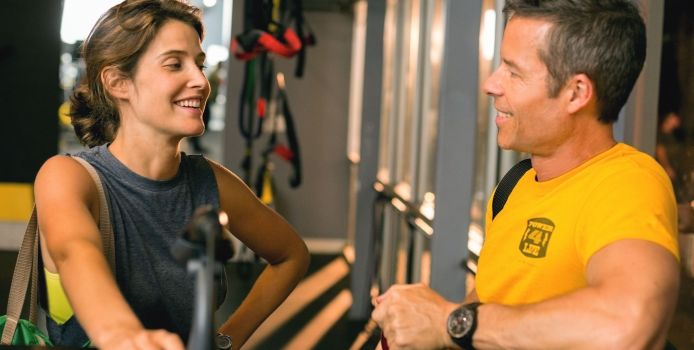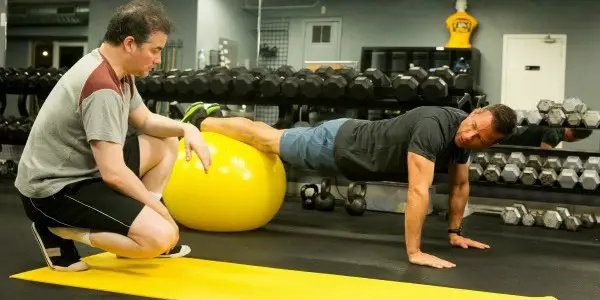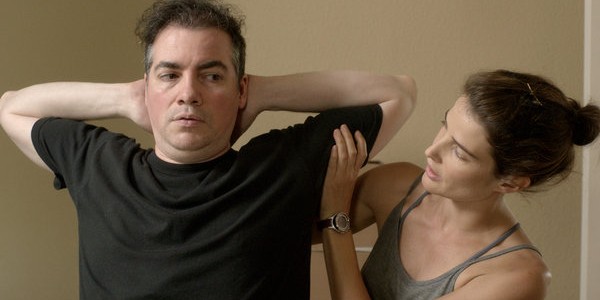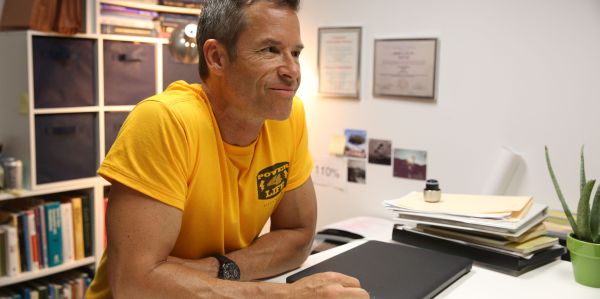RESULTS: America’s Particular Brand Of Fitness Culture

I'm a recent graduate of Bard College, where I earned…
At the start of Andrew Bujalski’s latest film, Results, Danny (Kevin Corrigan) entreats his wife, Christine (Elizabeth Berridge), from the street below the open window of their New York apartment to let him back into the marital home. She closes the window, so he grabs its ledge in an attempt to pull himself up to and through the plate glass barrier. Danny, who carries Corrigan’s rosaceous, wan features, brittle hair, and generous paunch (sorry, Kevin), quickly drops to the ground. His failure, a lack of upper-body strength, an unsexy display of defeatism in our culture of can-do-ism, sets into motion this unusual comedy about America’s particular brand of fitness culture, its cheap (but lucrative) ‘philosophies’, and our human urges – impartial, as they are, to time or place – that seem to underlie the institution of the modern American gym: sex and love.
Danny Goes to Texas
Danny appears in a gym in Austin, Texas, six months later, to hire professional fitness help. A bootcamp-style group workout is underway, led by Lorenzo (beefy Tishuan Scott), who barks orders and demands participants to not just do the plank, but be a plank, to be – and here there’s a small misapprehension of what planks are made of – to be “a solid rock.”

As a result, we can guess, of his failed marriage, Danny has settled in Austin semi-permanently, after coming to claim an enormous and unexpected inheritance left by his estranged mother. In fact, it’s the source of his wealth (mysterious for almost half the movie), and his penchant for bringing it up with strangers, that gives the gym’s owner, Trevor (Guy Pearce), the first clue to Danny’s oddness. Clue number two is his personal fitness goal: “I want to be able to take a punch . . . without puking or bleeding too much.” Unsure, perhaps, how to accomplish such a thing, Trevor accepts the client and assigns Kat (Cobie Smulders), with whom Trevor has a contentious and sometimes-sexual relationship, to conduct Danny’s in-home personal training sessions.
Down and out and living in an empty mansion, Danny quickly falls for the blunt, tough, and beautiful Kat, who holds fanatical stances on fitness and quitting (subjects at which Danny is respectively very bad and very good). She’s introduced, for example, through a scene in which she, while jogging through Austin suburbs, harasses a client for sneaking an undocumented cupcake.

Kat turns out to be as much a cynical foil to Trevor’s always-forward-looking, optimizing spirit as Danny, whose advice – that we stop trying to “control our descent” – sets in sharp relief things said in Trevor’s world of branded Wellness: “Part of achieving excellence is delivering excellence consistently.” In some ways, even, the film is about the clashing of worlds and sensibilities, and the entrance of Danny’s east coast depression into the lives of Trevor and Kat marks this clash. When told by Kat about Danny’s effort to woo her (with a jazz band), Trevor’s disgust proceeds more from the method than from the deed: “A jazz band, what the f*ck?”. Trevor confronts Danny at the latter’s home, and Kat, unable to suffer admirers and quitters, resigns shortly after.
It’s hard to know how much detail to go into after this point in the film, without including spoilers. But this raises the question: is it even possible for a film like this to be spoiled by knowing how it ends? I’m unsure, but I know this question doesn’t bode well for Results. It’s not a question of insufficient spectacle, or of being too ordinary. The Italian neorealists were celebrated for showing the ordinary. De Sica’s famous Bicycle Thieves, however, had at its core the portrayal of something important, the impossible ethical choices faced by the poor; also, what was ordinary for those aligned economically with its subject matter was extraordinary for the kinds of folks in the audience. Results depicts the ordinary, but settles on the neutral ground of simply being contemporaneous with the story and the audience, outside of neither. It’s this lack of challenge, of confrontation, that might make, for the first-time viewer, knowing how the story ends an inconsequential detail. What’s at stake, in the end?

Danny makes the fortuitous acquaintance of shady commercial lawyer Paul, Austin-connected and pot-scorer, played by Giovanni Ribisi. (Ribisi, by the way, for reasons unknown, seems to have become Hollywood’s anointed degenerate. Think Rum Diary, Middle Men, Ted, and now this.) A budding friendship between Danny and Trevor, with whom Paul tags along to offer legal services and drugs, makes for a semi-energetic, but overall unremarkable series of events in the latter half of the film. The only lingering question is to whom and in what capacity Kat will, in the end, return.
Results on Fitness
Bujalski keeps a safe but not uncritical distance from the facile world of fitness that Trevor partly represents, a world with which Results remains – situationally, at least – largely preoccupied. The name of his gym, Power4Life, suggests that nauseating mix of mass-marketed, philosophico-spiritual discourse with the emotional ‘optimization’ brought to you by corporate America. The ‘4,’ he explains to potential clients, corresponds to the number of, er, . . . elements of wellness (or something): physical, mental, emotional, spiritual. It’s no surprise of course that in practice, for Trevor and his clients, it is exclusively to the ‘physical’ that their efforts are devoted. Incidentally, the two, three, and the four are either superseded, or made useless by certain bodily exertions. Sex, to be sure, is something Bujalski keeps almost subliminally hidden along the way.
Though what makes Results an at times thoughtful and above all American film is the sympathy with which it regards Trevor, who Pearce plays with perfect and sweet credulity. Danny’s depression and Kat’s confrontational nature suggest at least a baseline recognition of the contingencies and contradictions of everyday (American) life. Trevor, who believes in “putting things out in the universe” and in “actualizing dreams,” lives comfortably to the fullest extent of an indisputable present – juice bars, boot camps, standing desks, and kale. And despite Bujalski’s subtle critique of fitness culture, of a certain part of the indisputable American present, he’s not unequal in his final judgement. Most of Kat’s clients, after all, are in pretty bad shape.
What did you think of the film’s take on fitness culture?
(top image source: Magnolia Pictures)
Does content like this matter to you?
Become a Member and support film journalism. Unlock access to all of Film Inquiry`s great articles. Join a community of like-minded readers who are passionate about cinema - get access to our private members Network, give back to independent filmmakers, and more.
I'm a recent graduate of Bard College, where I earned a B.A. in French Studies. Film figured prominently in my final year, and I'm currently chasing that interest, reviewing, researching, watching, and loving.














